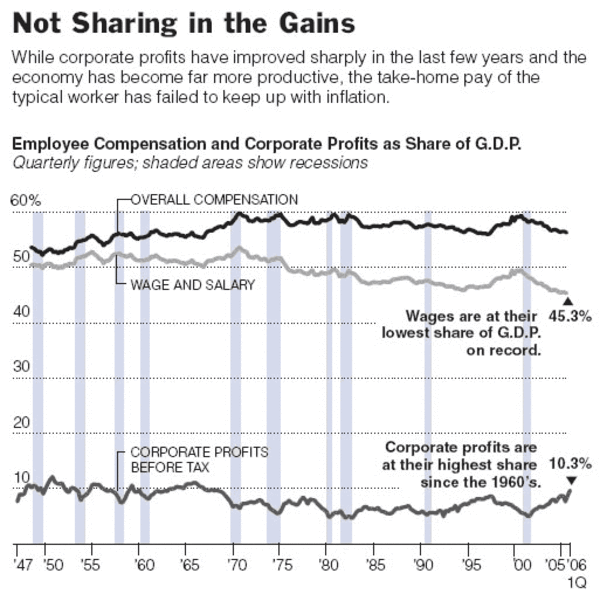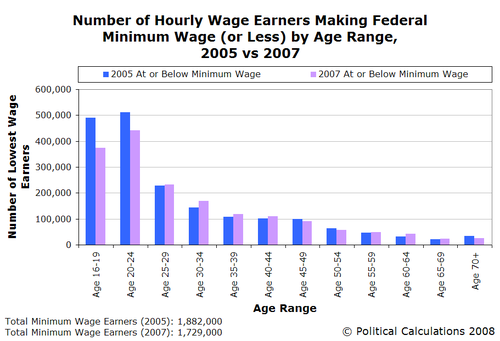We all know that the media is perfectly capable of ignoring even the most basic precepts of economics, but I thought Chris Plummer's article was especially heroic in doing so. Even more so, it is absolutely stunning in its arrogance. In his article, he writes on all the great ways that $8 a gallon gasoline will help make the world a better place. I will stay away from the global warming related issues -- I have a whole other blog dedicated to that -- but here are a couple of the most egregious parts:
They may contain computer chips, but the power source
for today's cars is little different than that which drove the first
Model T 100 years ago. That we're still harnessed to this antiquated
technology is testament to Big Oil's influence in Washington and
success in squelching advances in fuel efficiency and alternative
energy.
Given our achievement
in getting a giant mainframe's computing power into a handheld device
in just a few decades, we should be able to do likewise with these
dirty, little rolling power plants that served us well but are overdue
for the scrap heap of history.
OK, this first one is a science problem and not an engineering problem. Here is the problem: Gasoline contains more potential energy by weight and volume than any power storage source we have been able to invent (OK, its actually second, nuclear fuel is first, but I presume Plummer is not going there). That is the problem with electric cars, for example. Electric traction motors are demonstrably better sources of motive power than internal combustion engines. Even Diesel railroad engines are actually driven by electric traction motors. The problem is energy storage. Batteries store much less energy per pound and per cubit foot than gasoline. Ditto natural gas and hydrogen (except at very high pressures).
This claim that only the political power of oil companies keeps no-brainer alternative technologies at bay is absurd, though it is one that never dies in the lunatic fringes. Mr. Plummer is more than welcome to make himself a billion dollars by selling one of these mystery technologies he fails to disclose. I will be first in line to buy.
Necessity being the mother of invention, $8 gas would trigger all
manner of investment sure to lead to groundbreaking advances. Job
creation wouldn't be limited to research labs; it would rapidly spill
over into lucrative manufacturing jobs that could help restore
America's industrial base and make us a world leader in a critical
realm.
This is the broken window fallacy on steroids. I am a HUGE optimist about the limitless capabilities of the human mind, probably more so than Mr. Plummer (by the way, if he is such an optimist, he should read some Julian Simon). But the best that humanity can probably do any time soon is offset a goodly percentage of the damage from $8 gas. There is no net win here. If there were, he should also be advocating $10 bread, $2,000,000 starter home prices, and $200 a month internet service. Just think about all the innovation that would be required to react to these!
On a similar note, Venezuela's Hugo Chavez and Iran's Mahmoud
Ahmadinejad recently gained a platform on the world stage because of
their nations' sudden oil wealth. Without it, they would face the
difficult task of building fair and just economies and societies on
some other basis.
Yes sir. Chavez would be much worse off if he was getting $8 for his gas rather than $3. What is this guy thinking? Well, he says this:
In the near term, breaking our dependence on Middle Eastern oil may
well require the acceptance of drilling in the Alaskan wilderness
OK, but that can be done at $3 gas,and should have been allowed at $2 gas. This oil could have been developed in an environmentally friendly way years ago. Only Congressional stupidity stands in the way (probably with the past support of Mr. Plummer).
The recent housing boom sparked further development of
antiseptic, strip-mall communities in distant outlying areas. Making
100-mile-plus roundtrip commutes costlier will spur construction of
more space-efficient housing closer to city centers, including cluster
developments to accommodate the millions of baby boomers who will no
longer need their big empty-nest suburban homes.
Sure, there's plenty of
land left to develop across our fruited plains, but building more
housing around city and town centers will enhance the sense of
community lacking in cookie-cutter developments slapped up in the
hinterlands.
This is an aesthetic and taste argument (note the "antiseptic") - the author thinks that suburbs are un-aesthetic and he thinks that urban life is superior. Not surprising, as he chooses to live in San Francisco, and people there have self-selected for that kind of life. Fine. But I don't want it. And the idea that it is good to pay $8 for gas to conform to his aesthetics is sickening. (By the way, the opposite of antiseptic is germ-ridden. Why don't people ever therefore use that as a modifier for urban communities?)
OK, I can't really get to all his points, but I have saved perhaps the best for last. Here is one of the most incredibly condescending, authoritarian, and insensitive arguments I have ever seen. He thinks it is better for poor and middle class Americans to pay $8 a gallon for gas because:
Far too many Americans live beyond their means and
nowhere is that more apparent than with our car payments. Enabled by
eager lenders, many middle-income families carry two monthly payments
of $400 or more on $20,000-plus vehicles that consume upwards of
$15,000 of their annual take-home pay factoring in insurance,
maintenance and gas.
The sting of forking
over $100 per fill-up would force all of us to look hard at how much of
our precious income we blow on a transport vehicle that sits idle most
of the time, and spur demand for the less-costly and more
fuel-efficient small sedans and hatchbacks that Europeans have been
driving for decades.
So, doubling the cost of necessities for the average American will make them financially healthier? His argument is that people do all kinds of dumb things financially that a smart person like he would never do, and if gas prices drained everyone's wallet, they would not have any money left to make dumb purchases he does not approve of. If this is such a great idea, shouldn't we all just move to North Korea and have done with it?
The
anti-planner, where I got the link, has his own response.





 Wall Street Journal
Wall Street Journal